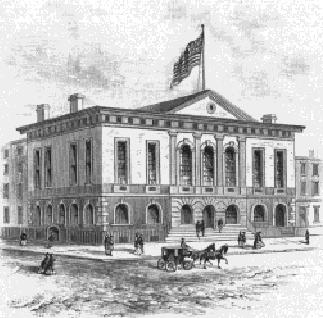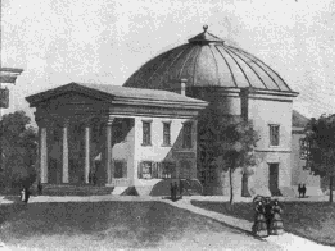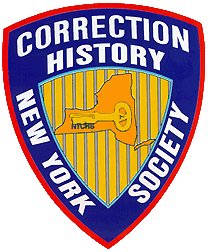Chapter II excerpts: 1816 - Jacob Radcliffe, Mayor (Continued)

|
|
Washington Hall
|
Of hotels there were at this period (1816) the City Hotel, opened in 1805 by John Lovett on the site of the present Boreel Building in Broadway; the Franklin House, corner of Broadway and Dey Street; the Park Place Hotel, corner of Broadway and Park Place; Congress Hall, Broadway near John Street; Washington Hall, on the site of the Stewart Building . . . .
The College of Physicians and Surgeons, originally the
King's College, built in 1767, and located in Barclay Street, near Broadway, was the only institution of the kind. The New York Hospital stood in the centre of the block included by Broadway, Church, Anthony, and Duane streets. In front a lawn extended to Broadway, and thereupon various societies, as the Fireman's, were permitted to assemble on occasion of annual parades,
etc. . . .
In the strait known and termed as the East River, though
it is in nowise a river, there was off Hallett's Point, in Hell Gate, a sunken rock of a peculiar form, which gave rise to a whirlpool known as The Pot, which at half flows of the tide was of an area and volume to render navigation in small vessels hazardous. Modern engineering has divested this strait of its terrors.
Blackwell's Island was at this time still in private hands. More than two centuries ago it was owned and occupied by John Manning, an exsheriff of New York, who was in command of the city and surrendered it to the Dutch on their attack in 1673; for which feat he was promptly cashiered by the English when they had renewed their possession. Manning left the island to his daughter, the wife of Robert Blackwell. The City bought it in 1828 for fifty thousand dollars.
The islands now called Ward's and Randall's were then known as Great and Little Barn Islands, "Barn" being apparently a corruption of Barent, an earlier name. Even "Randall's" seems an incorrect title, since the city bought this property in 1835 (also for fifty thousand dollars) from the executors of Jonathan Randall, who had given twentyfour pounds for it about seventy years earlier. This island,
then held by British troops, was the scene of a sharp action in September,
1776, when the assaulting column of Americans suffered a repulse with the
loss of twentytwo killed, and failed to gain the British ammunition
and stores which were the cause of the attempted surprise. . . .

|
|
The Rotunda
|
One of the basement rooms of the City Hall, a house in Eldridge Street, and one in Christopher Street, were occupied by the city watchmen, a small band of Arguseyed guardians of the peace, who were mustered at 6.30 P. M. in the winter and 9 in summer, and left for their homes soon after daylight. For day service there were a High Constable (Jacob Hays) and but twelve police officers; office, No. I, Basement of City Hall. The courts were all held in the City Hall. Between the area of the park, fronting on Chambers Street, and on the site of the present building of the Court of Sessions, was a circular building known as The Rotunda, which was used for the setting and exhibition of large paintings, statuary, etc., erected by subscription at the instance of John Vanderlyn, an artist; the Corporation having granted the ground free for a period of ten years, with the condition that the building was to become the property of the city at the termination of the grant. . . .
The salary of the Chancellor of the State and the Judges
of the Superior Courts was but two thousand dollars, and that of the Circuit Judges twelve hundred and fifty dollars. The Court of Sessions was presided over by the Recorder and two Aldermen; the Recorder, who sat as a member of the Board of Aldermen, over which the Mayor presided, was Richard Riker (famous as "Dicky" Riker). In case of fires, the watchmen in their vicinity gave the alarm to members of the Common Council, who attended the fire, bearing wands as insignia of their authority.
The public officers at this period, and for many years
afterward, were, as a class, and with some very notable exceptions, of
a different stamp from those of a much later and the present day. The Mayor
was elected by the Board of Aldermen; Judges, Sheriffs, Coroners, and Recorders were appointed by the Governor of the State; primary elections were unknown, and meetings composed of business men and taxpaying citizens, for the nomination of State and City officers, were usually held in the 'public hall or parlors of some of the principal hotels.
Notably, a convention for the nomination of a candidate
for Alderman of the Fifth Ward, in this year, was called under the signatures of the leading citizens of the ward and the place of meeting was the Washington Hall (Broadway, between Chambers and Reade streets), which would correspond to the Windsor or Murray Hill Hotel at this time. . . .
The facilities for local travel in that year will appear
to readers of the present time even more restricted than were the boundaries of New York. Thus, within the city proper one had to go on foot or take a "hack". The public passenger conveyance to Harlem was by a stage leaving Harlem, at 125th Street and 3rd Avenue, early in the morning, arriving in Park Row and leaving there in the afternoon. Fare, twenty five cents. The Greenwich neighborhood was served by Asa Hall, who had a stable in Hudson Street, corner of Charles Street, and ran a stage, five round trips per day, to the southwest corner of Pine and Nassau Streets, leaving Greenwich at the even hour and returning at the odd. Fare, twentyfive cents. . . . .
|



